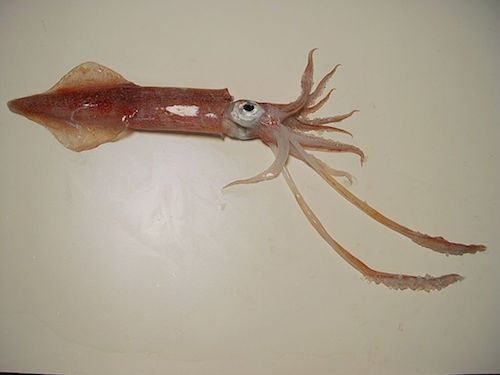 Evolution
Evolution
 Intelligent Design
Intelligent Design
Squid Recodes Its Own RNA

Researchers at Tel Aviv University were not planning on shaking a pillar of Darwinism when they found something interesting: an animal that can re-code its own protein library "on the fly" to adapt to its surroundings. A news item starts with a description of the old status quo:
The principle of adaptation — the gradual modification of a species’ structures and features — is one of the pillars of evolution. While there exists ample evidence to support the slow, ongoing process that alters the genetic makeup of a species, scientists could only suspect that there were also organisms capable of transforming themselves ad hoc to adjust to changing conditions. (Emphasis added.)
That’s what they found with a squid. It’s as if a copy editor takes a library book and adapts an excerpt for different purposes: one for the newspaper, one for the formal journal, one for Facebook. By studying RNA editing (a process where RNA transcripts of DNA are modified en route to being translated to protein), they found that most of the proteins in a squid were edited:
"We have demonstrated that RNA editing is a major player in genetic information processing rather than an exception to the rule," said Dr. Eisenberg. "By showing that the squid’s RNA-editing dramatically reshaped its entire proteome — the entire set of proteins expressed by a genome, cell, tissue, or organism at a certain time — we proved that an organism’s self-editing of mRNA is a critical evolutionary and adaptive force."
The question that should immediately come to mind is this: Is RNA editing an unguided process, or does it exhibit signs of functional purpose? After all, some human diseases are known to result from abnormal RNA editing. But if the edits were random, how could an animal survive at all? The researchers tell what led them to study cephalopods:
The changing physiological appearance of squid and octopuses over their lifetime and across different habitats has suggested extensive recoding might occur in these species. However, this could never be confirmed, as their genomes (and those of most species) have never been sequenced.
Finding that RNA editing in squid was the rule, not the exception, led them to suspect a purpose behind it.
"It was astonishing to find that 60 percent of the squid RNA transcripts were edited. The fruit fly, for the sake of comparison, is thought to edit only 3% of its makeup," said Dr. Eisenberg. "Why do squid edit to such an extent? One theory is that they have an extremely complex nervous system, exhibiting behavioral sophistication unusual for invertebrates. They may also utilize this mechanism to respond to changing temperatures and other environmental parameters."
RNA editing is not new, but finding it to be a "major player" is, indeed, "astonishing." Needless to say, finding RNA editing at such a large extent raises lots of questions. For one thing, it casts another strong blow at the "Central Dogma" of genetics (the idea that DNA is the master control of the cell). The Central Dogma has been running on hard times for years now. But if DNA is not controlling what proteins are manufactured, what is?
"We would like to understand better how prevalent this phenomenon is in the animal world. How is it regulated? How is it exploited to confer adaptability?" said Dr. Eisenberg. "There may be implications for us as well. Human diseases are often the result of ‘misfolded’ proteins, which often become toxic. Therefore the question of treating the misfolded proteins, likely to be generated by such an extensive recoding as exhibited in the squid cells, is very important for future therapeutic approaches. Does the squid have some mechanism we can learn from?"
It’s hard for them to imagine any organism taking its genes and recoding them into nonsense transcripts that won’t fold. Squid, after all, have "an extremely complex nervous system, exhibiting behavioral sophistication," they say. You may recall that proverb in Flight: The Genius of Birds that Paul Nelson learned from his father, "If something works, it’s not happening by accident."
It’s too early to say what this surfeit of RNA editing means. Is this how different cells in a body take the same DNA code and generate different tissues from it? Is this how an animal adjusts to a new environment? How does the RNA editing process interact with environmental cues? How much editing can a protein tolerate? How widespread is it in other animals? What does this do to Darwinian mutation-selection theory? Could this be the start of the next revolution in genetics?
Obviously, the squid swims in the ocean just fine, using its complex camera eyes, rapid color changes, hunting behaviors, and all the rest. To researchers not rigidly committed to Darwinian thinking, we’d suggest that a design-theoretic approach to this phenomenon is likely to bring major insights.
Image credit: SEFSC Pascagoula Laboratory; Collection of Brandi Noble, NOAA/NMFS/SEFSC (NOAA photo librairie) [Public domain], via Wikimedia Commons.
